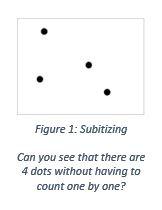Dyscalculia in Mathematics

Dyscalculia in Mathematics
On Tuesday 31st May, the school held a workshop on Dyscalculia for parents and teachers. The presenter was Associate Professor Dr Judi Humberstone, who runs a dyscalculia clinic associated with the University of Melbourne. Below is a summary of her presentation.
Dyscalculia is “A condition that affects the ability to acquire arithmetical skills. Dyscalculic learners may have difficulty understanding simple number concepts, lack an intuitive grasp of numbers, and have problems learning number facts and procedures.”[1] Students with dyscalculia can have great difficulty acquiring number and math concepts, with potential consequences for their schooling, self-esteem and career pathways.
It is important to note that dyscalculia is NOT related to low intelligence or ability. It is a specific learning difficulty related to the wiring in particular sections of the brain. Also note that students can have specific mathematics difficulties that are NOT related to dyscalculia. Dyscalculia has very specific indicators: it needs to be diagnosed by a professional and strategies exist for helping these students.
Dyscalculia generally involves difficulty in the following areas:
1. Subitizing, which is the ability to automatically see how many dots are in a small group without having to count one by one.
2. Comparing two numbers to decide which is greater
3. Placing marks accurately on a number line
Four classroom strategies were presented to help these students. These were:
- Intensive number comparison
- Multiple representations – concrete, visual, abstract
- Automatise arithmetic
- Maximize motivation
The mathematics teaching team are excited by the new learning and the opportunities presented to make our classes more inclusive. We have started exploring these strategies with the aim to embed them in our classroom practice for all students.
This workshop was organized in partnership between interested parents, Mrs Kindler and the teachers. The opportunity to attend together and share the learning journey acted as a powerful tool to help us connect our understanding and build productive partnerships.
Colin Shnier
Learning Specialist, Teaching for Inclusion
[1] DfES (2001, Dec 5). Guidance to Support Students with Dyslexia and Dyscalculia. http://scotens.org/sen/resources/dyslexia_leaflet_maths.pdf


